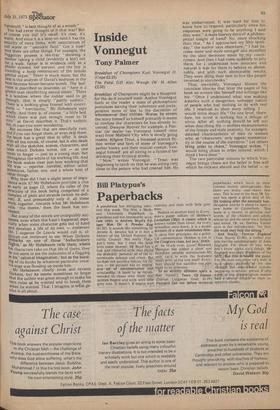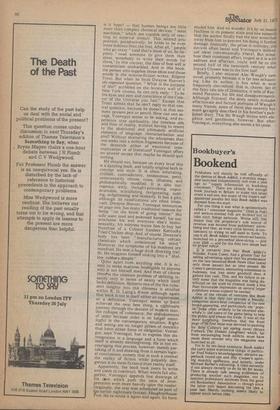Inside Vonnegut
Tony Palmer
Breakfast of Champions Kurt Vonnegut Jr. (Cape £2.25) The Fatal Gift Alec Waugh (W. H. Allen £2.50) Breakfast of Champions might be a blueprint for the do-it-yourself book. Author Vonnegut hurls at the reader a mass of philosophical postulates leaving their coherence and juxtaposition more or less to the discretion of whomsoever they titillate. Worse, he enters the story himself as himself primarily it seems to confuse the characters he has already invented. Dwayne Hoover for example, a Pontiac car dealer (as Vonnegut himself once was) from Midland City who is slowly going insane, Kilgore Trout, a harassed science fiction writer and hero of some of Vonnegut's earlier books, and their mutual creator, Vonnegut himself, are all sitting in a fictional bar drinking their fictional drinks.
"Now," writes Vonnegut, "Trout was beginning to catch on that he was sitting very close to the person who had created him. He
was embarrassed. It was hard for him to know how to respond, particularly since his responses were going to be anything I said they were." A mere literary device? A philosophical sleight of hand? No, more shocking than that. " As I approached my 50th birthday," the author says elsewhere, "I had become more and more enraged and mystified by the idiot decisions made by my countrymen. And then I had come suddenly to pity them, for I understood how innocent and natural it was for them to behave so abominably, and with such abominable results. They were doing their best to live like people invented in storybooks."
Thus, inevitably, Vonnegut blames the countless idiocies that litter the pages of his book on writers like himself and writings like his. "Once I understood what was making America such a dangerous, unhappy nation of people who had nothing to do with real life, I resolved to shun story telling. I ... would write about life "On one level, therefore, his novel is nothing but a deluge of trivia. After all, nothing should be left out when describing life — endless measurements of the female and male anatomy, for example, detailed characteristics of men or women who, as 'characters,' only appear momentarily in the course of the narrative." Let others bring order to chaos," Vonnegut writes, "I would bring chaos to order instead, which I think 1 have done."
The two particular notions to which Vonnegut brings chaos are the belief in free will which he reckons absurd and the belief — or
is it hope? — that human beings are little more than complex chemical devices, " meat machines," which are capable only of reacting to external stimuli, This second proposition, paradoxically, he holds to be even more dubious than the first. After all, " people who go crazy "(and that's most of us, he implies) " need someone to give them their ideas, somebody to write their words for them." In this context, the idea of free will is romanticism unshackled. And in this book,
the person who supplies those ideas and those words is the science-fiction writer, Kilgore Trout. But when he finds Dwayne Hoover's oft-repeated question, " What is the purpose of life?" scribbled on the lavatory wall of a New York cinema, he can only reply: "To be the eyes and ears and conscience of the Creator of the Universe you fool." Except that Trout admits that he can't reply to that cen tral question, because he doesn't at that moment possess pen or pencil. How can one es cape, Vonnegut seems to be asking, and ex perience true spirituality, the timeless ebb and flow of reality, without having to resort to the abstracted and ultimately artificial elements of language, characterisation and plot? Without shattering the wholeness that one seeks into a million fragments because of the demands either of emotional communication or of literature? Vonnegut offers no answer except that maybe he should quit writing.
He should not, because on every level this is a dazzling book, and totally original both in
concept and style. It is often infuriating,
childish, contradictory, tendentious, petty, unnecessarily obtuse, crass, illiterate, and philosophically muddled. It is also out rageous, witty, thought-provoking, unputdownable, scintillating, invigorating, nobl ing, enlightening and masterly. It has a plot, although its ramifications are often irrelevant. Dwayne Hoover, Vonnegut announces on page one, has many traditional reasons for
being " on the brink of going insane." His wife went mad and poisoned herself; his son
proclaims his and everyone else's homo sexuality; his mistress wants him to buy her franchise of a Colonel Sanders Kentucky Fried Chicken shop. And, of course. Dwayne's body has been "manufacturing certain chemicals which unbalanced his mind."
Moreover, the symptoms of his madness are manifold. He sees a huge duck directing traffic. He imagines himself sinking into a " shallow, rubbery dimple." Quite apart from anything else, it is nc: easy to make madness intelligible to anyone who is not himself mad. And then of course thereais the ultimate problem of defining insanity only in terms of sanity which itself lacks definition. Hitherto one of the few cohe rent insights into this dilemma is entailed within R. D. Laing's Knots although again that book is not in itself either an explanation or a definition. Vonnegut seems to have achieved the next best thing, a nightmare journey through the descent of modern man, the collapse of coherence, the abandonment of order because order is no longer mean ingful in the contemporary situation. Right and wrong are no longer pillars of morality that have either force or obligation. Vonne gut, says Vonnegut, has to express this dis integration in a language and a form which itself is already disintegrating. He is not en couraging this process, however, merely partaking of it and drawing from it certain logical conclusions, namely that in such a context the reality of fiction while palpably dangerous is no more fictional than reality itself.
Apparently, the book took years to write and years to construct. When words fail altogether, Vonnegut appends line drawings of his own which push the onus of interpretation even more heavily upon the reader. Originally, the text was scheduled as part of his earlier nightmare fantasy, Slaughterhouse Five. He re-wrote it again and again. Its form eluded him. And no wonder. It's by no means faultless in its present state and one suspects that the author finally had the text wrenched away from him to prevent his doing it further damage. Ironically, the prose is ordinary, the devices often banal and Von negut's individual ideas conventionally liberal. But somehow their combined effect, tinged as it is with sadness and affection, could well be to the second half of the twentieth century what Joyce's Ulysses was to the first half.
Briefly, I also enjoyed Alec Waugh's new novel, probably because it is far less exhausting. Like its author, it has what is now frequently discredited: that is, charm. Set in the fairy tale isle of Dominica, it tells of Raymond Peronne, his life and disappointments. Although fictional, the story neatly includes affectionate and factual portraits of Waugh's many friends, some of them also recently but more savagely described in his brother's published diary. This Mr Waugh writes with elegdnce and gentleness, however. But after Vonnegut, everything else seems a bit tame.































 Previous page
Previous page